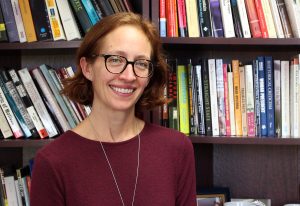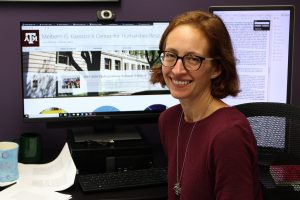Professor Credits Glasscock Fellowship with Advancing Research, Journal Review Process
Dr. Tasha Dubriwny is one of four professors honored with the Glasscock Internal Faculty Residential Fellowship for the 2019-2020 school year. Dubriwny credits the fellowship with advancing her research into contemporary reproductive rights rhetoric.
By Madison Brown
 Tasha Dubriwny, Ph.D., has spent the fall semester immersed in both her research and that of other rhetorical scholars delving into the language used by abortion rights advocates in their arguments for women’s reproductive rights.
Tasha Dubriwny, Ph.D., has spent the fall semester immersed in both her research and that of other rhetorical scholars delving into the language used by abortion rights advocates in their arguments for women’s reproductive rights.
By the end of the academic year, Dubriwny said she expects to have two articles under review by academic journals. She credits her selection for a Glasscock Internal Faculty Residential Fellowship with helping her achieve this goal.
“I’m honored, and I feel hugely privileged to be able to have the fellowship,” said Dubriwny. “I am working on completing two essays right now with the goal of having them under review by academic journals at the end of semester. I am excited about that and they would not have been possible to complete this semester without the fellowship.”

Dr. Dubriwny is the only professor of the four Glasscock Internal Faculty Residential Fellowship recipients with a joint appointment in the Departments of Communication and Women and Gender Studies. Her research engages the intersection of feminism, politics, and health from a rhetorical perspective.
An associate professor for Communication and Women and Gender Studies, Dubriwny is one of four College of Liberal Arts professors awarded the 2019-2020 Glasscock Fellowship, which provides
professors, graduate and undergraduate students with resources to move forward with research in the humanities. The award includes a one-semester teaching release, $1,000 research bursary, and an office in the Glasscock Center during fellowship year.
Recipients are expected to present and participate in the Faculty Colloquium Series during their time as a fellow. Dubriwny’s research during the fellowship has explored the rhetoric of contemporary reproductive rights.
“I’m interested in thinking about what it means that since Roe v. Wade we are always focused on issues of individual rights,” said Dubriwny. “Which, of course, positions women against their fetus with the growing fetal personhood movement, and how then reproductive rights and justice advocates are grappling with that.”
Dubriwny said she is looking at three specific case studies to analyze the rhetorical strategies used by three different reproductive rights groups.
“One is an analysis of women’s narratives about their late-term abortions; the second is a discussion of how pro-choice, Christian citizenship is envisioned by three NYT bestsellers that is about what it means to be Christian and a reproductive rights advocate,” said Dubriwny. “The third looks specifically at the work of reproductive justice advocates.”
Dubriwny’s research into women’s health and reproductive rights is close to home.
“I focus on women’s health because I have watched women in my family grapple with various health issues over the years, including my mom who was diagnosed with breast cancer while I was in college,” said Dubriwny. “It caused me to think about the importance of women’s health issues and research about women’s health.
“I’m not coming at it from quantitative or qualitative health communication perspective, but rather a feminist rhetorical perspective,” explained Dubriwny.
The Department of Communication has a “great track record” of faculty receiving the Glasscock Internal Faculty Residential Fellowship award including Cara Wallis, Jennifer Mercieca, Randy Sumpter and several others, said Dubriwny.
“If you are a faculty member doing research in the humanities, it is smart to always know what the opportunities are for you over in Glasscock,” said Dubriwny. “It’s a program that Communication faculty in particular take great advantage of, and it really is hugely instrumental in getting our work and research moving forward.”
- Dept News
- Faculty
- In the Department
- Research
- Abortion Rights
- Abortion Rights Activists
- Breast Cancer
- Climate and Inclusion Committee
- College of Liberal Arts
- COMM Research
- Communication
- Communication Research
- Department of Communication
- Dr. Dubriwny
- Dr. Tasha Dubriwny
- Feminism
- Feminist
- Glasscock Fellowship
- Glasscock Internal Faculty
- Glasscock Internal Faculty Residential Fellowship
- New York Times Bestsellers
- Professor Dubriwny
- Professor Tasha Dubrwiny
- Reproductive Rights Advocate
- Research
- Roe v. Wade
- Women and Gender Studies
- Women's Health Research
